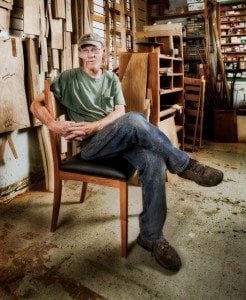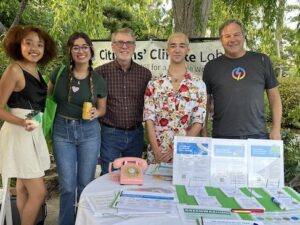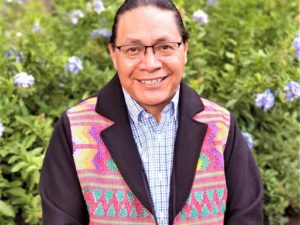The quest for common ground in coal country
By Davia Rivka
Jim Probst is a furniture maker in West Virginia. But before I tell you his story, let me tell you a few things about West Virginia.
There are 1.8 million people living there. But folks are leaving. The state is officially in a recession and parts of southern West Virginia are in a depression. It has the highest drug overdose rate among youth in the country.
Things are not going so well there.
Coal is being replaced as the fuel for generating electricity by its cheaper, more efficient sister – natural gas. In a Marketplace report earlier this month, Charles Patton, president of Charleston-based Appalachian Power, said, “Forget the Clean Power Plan. You cannot build a coal plant that meets existing regulation today that can compete with $5 gas. It just cannot happen.”
There’s also a widening gap in coal mine productivity between Western and Eastern mines. Montana (with 942 coal miners) produces more coal than Virginia (with 5,262 coal miners). Wyoming (with 5,837 coal miners) produces more coal than West Virginia, Kentucky, Pennsylvania, Virginia, Alabama, and Illinois combined (with a total of 58,995 coal miners). Due to this discrepancy, the coal mining industry has increasingly moved production to these Western states (especially to the Powder River Basin), and has dramatically cut its workforce in Appalachia.
The reality has pushed four of the top five coal producers in the country into bankruptcy proceedings.
More bad news. West Virginia has the highest percentage of working-age people on disability benefits (17.6%), far above the national average of 10.4%, according to 2012 data. And the worst rates of obesity, cancer and diabetes.
Contrast this, for instance, with Los Angeles, my hometown. My member of Congress is a Democrat. Climate change is one of his top priorities — sounds like a piece of cake, right? But it’s not all roses — he’s a cap and trade man and he cups his hands over his ears when we say carbon fee and dividend.
Yes, I’m whining a little bit. But that got me thinking. What if I lived in Texas, say? Or heaven help me, West Virginia? How much whining would I be doing then? How persistent would I be? How audacious? How defeated?
So I decided to find out what it’s like to be a member of a CCL chapter in the heart of coal country. Jim Probst was my go-to guy.
In 2014, as Jim got closer to retirement, he wanted to do something about climate change. Serendipitously, he got a call from a friend in Indiana introducing him to CCL. At that time there were no CCL chapters in West Virginia. With relentless support from Elli Sparks, grassroots national manager, they launched the first group in the spring of 2014. And now two years later, thanks to Jim’s tireless efforts, there are five groups in West Virginia. If you try to congratulate him on his hard work, he counters with, “but the groups are not that strong. Some of them are really struggling.” But if you ask Elli, she’ll say he’s a rock star.
West Virginia used to be a blue state — with two Democratic senators and three Democratic members of Congress. Not so anymore. One senator is a Democrat, the other a Republican and the three members of congress are all Tea Partiers. Despite political differences, the West Virginia CCL groups do meet with their representatives. However, as Jim says, “we meet, everyone is polite, nothing substantive happens and then we leave.”
After all, coal will be impacted hard by CCL policy. Carbon pricing will double the cost of coal, from $40 to $80 a ton in the first year. West Virginia coal is already more expensive than Wyoming coal.
“Talking carbon fee and dividend with my MoC was a big waste of time.” Jim had all but given up trying to talk to his member of Congress.
It was hearing a Jay Butera story at the Mid-Atlantic regional conference that gave Jim the juice to keep going. Jay, in his quiet, persistent way, was trying to establish a relationship with David Jolly’s congressional office. He continued to go back and back and back to the office until David Jolly became the thirteenth co-sponsor of the Republican Congressman Chris Gibson’s climate change resolution.
Jay’s story was just what Jim needed to hear. He returned to West Virginia fired up and ready to go. His new strategy; find common ground, listen for what they need, make it happen. So he stopped talking carbon fee and dividend and instead started to talk about the Reclaim Act — a bill in Congress introduced by Hal Rogers from Kentucky — where $1 billion would be returned over five years to foster economic development and reclaim land once used for coal mining. Jim’s thinking went like this — if CCL folks could help get the bill passed it would turn some heads and it would change the way the congressional offices listened to the folks from CCL.
With Mark and Danny’s blessing, Jim and other CCL members set about contacting group leaders and liaisons in key congressional districts — making them aware of the bill, telling them how it would benefit coal states and urging them to support the legislation. Legislators started to listen. Not just with southern politeness, but genuine curiosity and appreciation.
Things are shifting. Outcomes are uncertain. But one thing we know for sure: We all come up against closed doors and unwelcome mats, whether we’re in a coal country depressed district, a Democratic cap-and-trade or a sea level-rising district. That is a given.
Here’s the gift. Find the opportunity. Learn to think inside out and upside down. When one door slams shut, crawl in the window or lower yourself down the chimney. Come back with flowers or chocolate. No matter whose district you’re living in — there’s always room for crazy, wild-eyed imaginative, gracious action. And that’s what makes all the difference.






